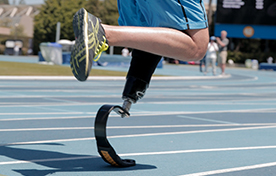
Conal Doyle obtained a $1,750,000 settlement on behalf of a 42 year old woman who was denied two prosthetic limbs by a national insurance company. The plaintiff, a bilateral amputee, lost both legs when a car ran into her while she was retrieving mail from her mailbox.
During her grueling recovery and rehabilitation, her prosthetist prescribed two new microprocessor prosthetic limbs, and even forwarded video of the plaintiff walking with the aid of prosthetics to the insurance company’s Medical Director. The insurance company denied the claim, alleging that the legs were not “medically necessary.”
Mr. Doyle was retained, and filed suit immediately. Within days, the insurance company agreed to pay the claim, and paid the prosthetist over $180,000 to provide the new prosthetics. Before discovery commenced, Mr. Doyle negotiated an additional $1,750,000 in a damages settlement, for a total recovery of over $1,940,000.
This is the largest reported settlement of an individual prosthetic limb bad faith insurance denial in California history.
Conal Doyle obtained an $850,000 damages recovery plus payment of a $100,000 prosthetic arm on behalf of a thirteen year old girl who was denied an ilimb myoelectric arm by her health insurer. Through the lawsuit, Mr. Doyle was able to convince the insurance company that they wrongfully denied the claim and faced exposure at trial to punitive damages and attorney’s fees. The insurance company, a major national health insurer, resolved the case before commencement of discovery at an early mediation. The total recovery, including payment of the prosthetic, was just under $1 million.
Conal Doyle obtained an $800,000 damages recovery plus payment of a $75,000 prosthetic arm on behalf of a young actor who was denied a myoelectric arm by a major national health insurer. The plaintiff’s arm had been amputated due to cancer and he needed a prosthetic arm to obtain TV and commercial roles, as well as care for his three young children. The same insurer had denied him a prosthetic arm just three years earlier, and settled a lawsuit resulting from that denial for $525,000. The insurer did not learn it’s lesson the first time, and settled the second case for a total of almost $900,000, before commencement of discovery.
Conal Doyle was lead trial counsel in this medical malpractice case that settled in March 2015. The plaintiff went into septic shock after she received inadequate treatment for a urinary tract infection and kidney stone obstruction. As a result, all four of her limbs were amputated. This case was governed by MICRA, the California law that limits non-economic damages to $250,000 for “pain and suffering.” Consequently, the settlement amount represented the cost of future medical care and was one of the largest actual recoveries by a medical malpractice plaintiff in California history. Conal Doyle used his intimate knowledge of prosthetics to ensure that the future Life Care Plan represented full and fair compensation for the plaintiff.

Conal Doyle obtained a $750,000 settlement on behalf of a 35 year old woman who was denied a prosthetic limb by a national insurance company. The plaintiff was denied a microprocessor knee (“c-leg” by Ottobock) because the insurance company maintained it was “experimental and/or investigational.” After filing suit, Mr. Doyle forced the insurance company to approve and pay for the C-leg and obtained an additional $750,000 settlement before discovery commenced.

Conal Doyle obtained a $525,000 settlement on behalf of an amputee whose health insurance company denied his claim for a myoelectric prosthetic arm (i-limb). The large health insurance company denied the arm-arguing that the claimant should wear a ‘body powered’ prosthesis, essentially a manual arm slung over one shoulder with a “hook” at the end. The plaintiff, a young actor, student, and father of two young girls, persisted, arguing that he needed a myoelectric arm to obtain acting jobs and to safely interact with his children. After suit was filed, and before discovery began, a settlement was reached where the defendant approved the claim for the i-limb (paying out more than $125,000), and settled the damages claim for an additional $525,000. Due to his national reputation in the field, Mr. Doyle obtained this recovery without taking a single deposition.

Conal Doyle obtained a $475,000 settlement on behalf of an amputee whose health insurance company denied her claim for a myoelectric prosthetic arm (i-limb). The large health insurance company denied the arm-arguing that the arm was not “medically necessary.” The plaintiff, a 58 year old school teacher, persisted, arguing that she needed a myoelectric arm for the dexterity it provided in writing on the blackboard and otherwise carrying out her duties as a schoolteacher. After suit was filed, and before discovery began, a settlement was reached where the defendant approved the claim for the i-limb (paying out more than $100,000), and settled the damages claim for an additional $475,000. Due to his national reputation in the field, Mr. Doyle obtained this recovery without taking a single deposition.

Conal Doyle obtained a confidential settlement on behalf of Cheri Cullen, an above the knee amputee, who is a 44 year old mother of two. Blue Cross authorized and paid for a microprocessor knee for Ms. Cullen in 2003, yet denied coverage for that same device in 2009, alleging that it is “experimental and investigational.” Blue Cross has maintained this position despite the fact the C-leg has been well accepted and recognized as a standard prosthetic device for almost ten years. All above the amputee soldiers returning from war are offered a C-leg from Walter Reed Medical Center, the C-leg is FDA approved, and recognized as standard prosthetic technology by countless other insurance companies. Blue Cross’ denial of prosthetic benefits is explained solely by the fact that the C-leg is considerably more expensive than the alternative prosthetic option.

Conal Doyle obtained a settlement in Hughes v. Aetna, a lawsuit filed in federal court in Florida, forcing Aetna Insurance to pay the full amount of the benefit at issue and $25,000 in attorneys fees prior to any discovery being conducted in the case. The plaintiff, Karen Hughes, is an above the knee amputee, who was denied a microprocessor knee (C-Leg) by Aetna, her health insurance company. Aetna alleged that the C-leg, on the market in the United States since 1999, was “experimental and investigational” and thus initially denied the benefit. On appeal, Aetna determined that the C-leg was not “experimental and investigational” and authorized payment.
Nevertheless, Aetna failed to pay for the benefit for more than eight months, forcing Ms. Hughes to file suit in federal court. Due to the fact she was insured by an employer health plan, Ms. Hughes’ claim was governed by ERISA, a federal statute that pre-empts state law and limits recovery to the value of the denied benefit and provides a federal judge discretion to award attorneys fees.

Conal Doyle was co-lead counsel in a claim against Anthem Blue Cross of California for denial of prosthetic benefits to a 19 year old man who lost his leg to cancer. Owen Beck’s prosthetist and physician recommended a microprocessor knee prosthesis (C-Leg), but Blue Cross, maintained that the C-leg, on the market in the United States since 1999, was “experimental and investigational” and thus denied the benefit, and withheld that decision on appeal. Mr. Beck pursued damages for the cost of the benefit, emotional distress, and punitive damages. The case was resolved after pre-suit demand. Blue Cross insisted that the terms of the pre-suit settlement be confidential. Conal Doyle donated a portion of his time on the case to Public Justice, as a pro bono contribution.









